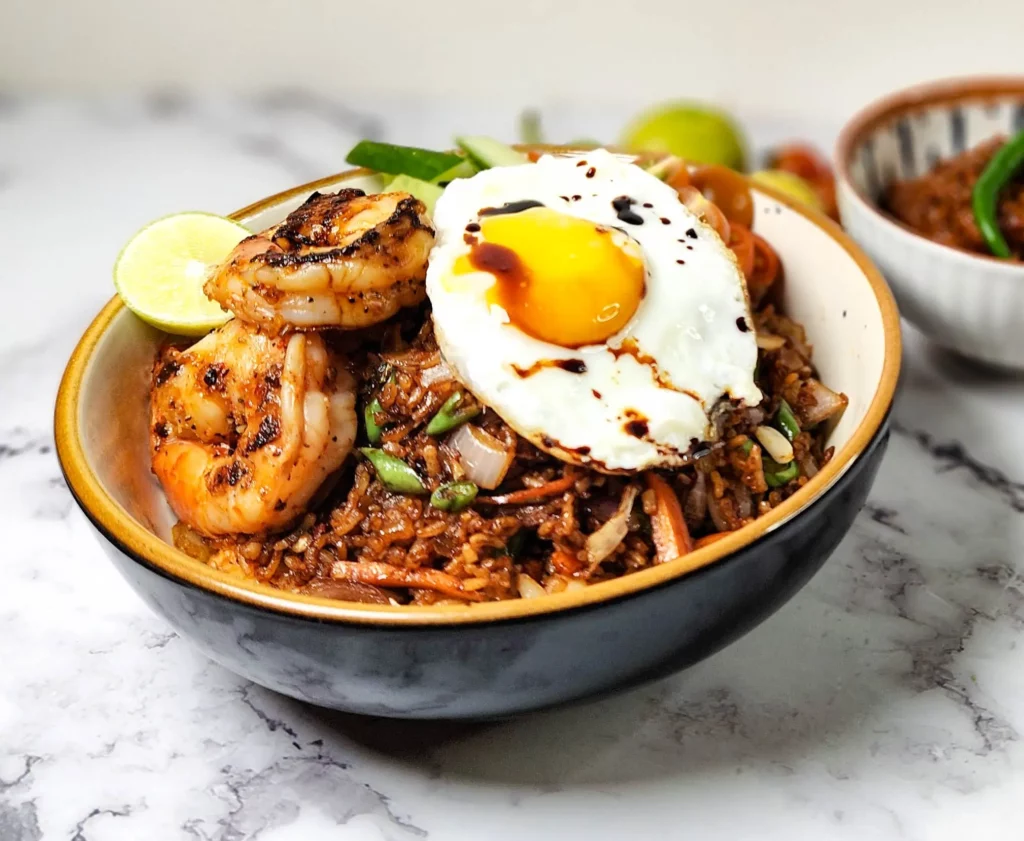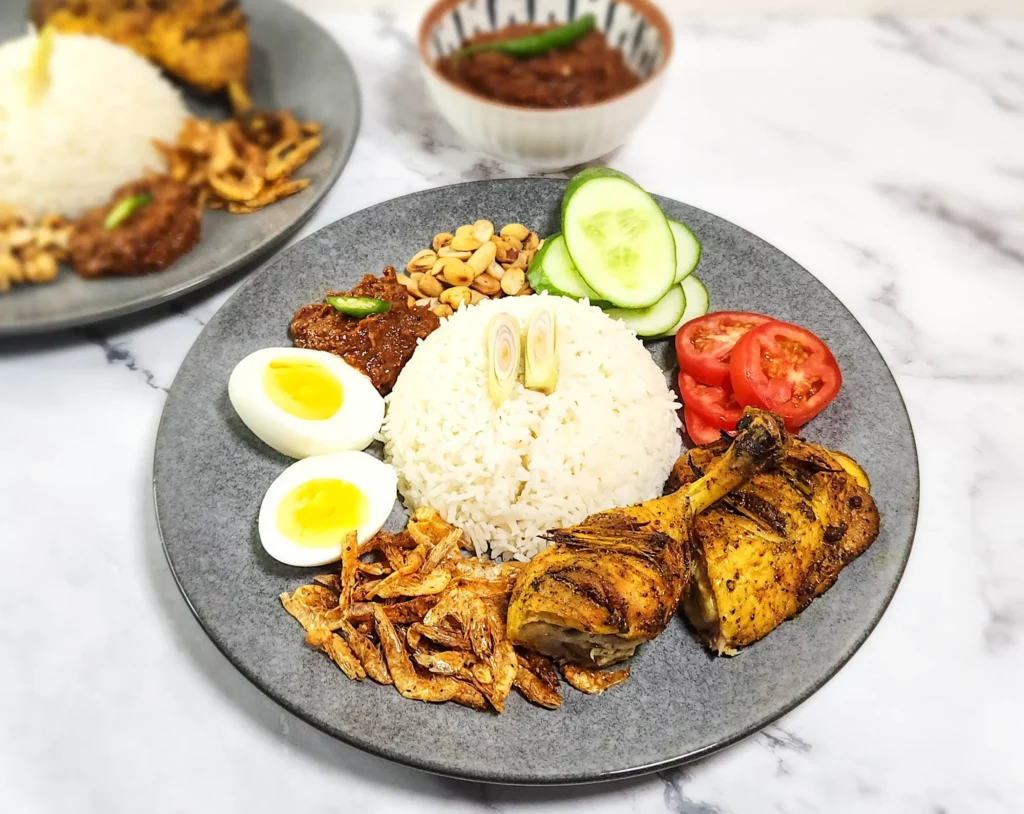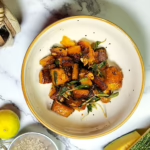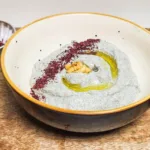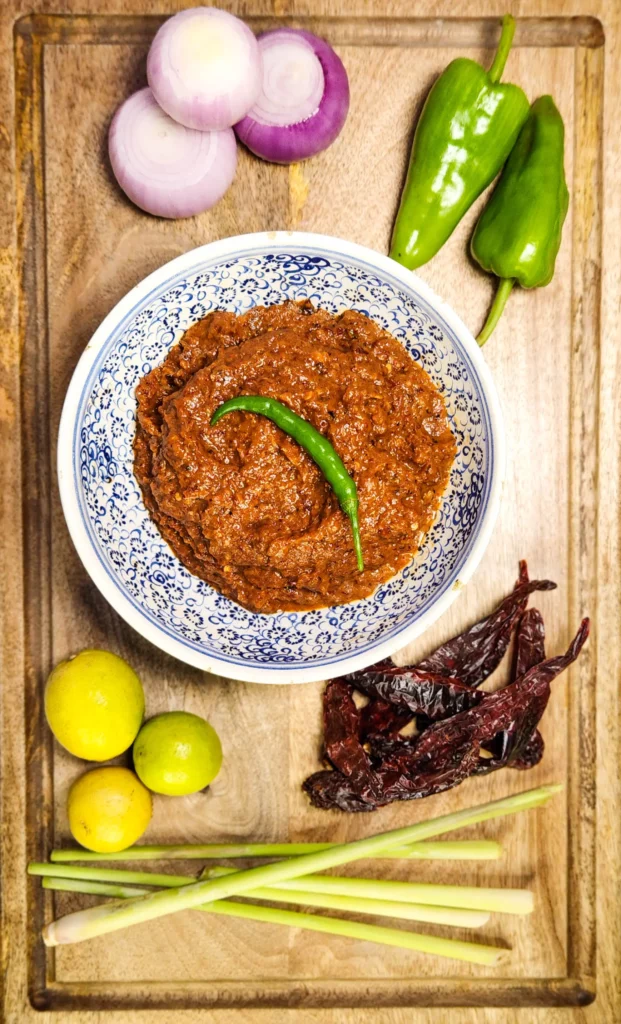
Indonesian Sambal with Shrimp Paste
Avengers A-sambal
What is Indonesian Sambal?
Sambal is a Southeast Asian condiment, the version shown here is a version of Sambal Terasi. This Indonesian Sambal recipe has a combination of chillies, garlic, vinegar and shrimp paste (terasi), made into a spicy, umami and slightly sweet sauce. It is served with a whole range of Indonesian / Malay / Singaporean food, including Nasi Goreng, Nasi Lemak, Ayam Goreng (fried chicken) and Ikan Bakar (grilled fish). You can use it in stews, fried rice, grilled meats, tacos or anything that would benefit from a spice kick.
You’ll love it if…
… you love the umami, spicy flavours of Indonesian food. If you’re a fan of chilli garlic sauce or gochujang, this Indonesian sambal is for you.
Fair warning though, raw terasi (Indonesian fermented shrimp paste) has a strong smell. Once it’s gone through the cooking process, the smell diminishes greatly and it adds a rich umami (but not overly fishy) flavour to the sambal. Best made in a well ventilated kitchen.

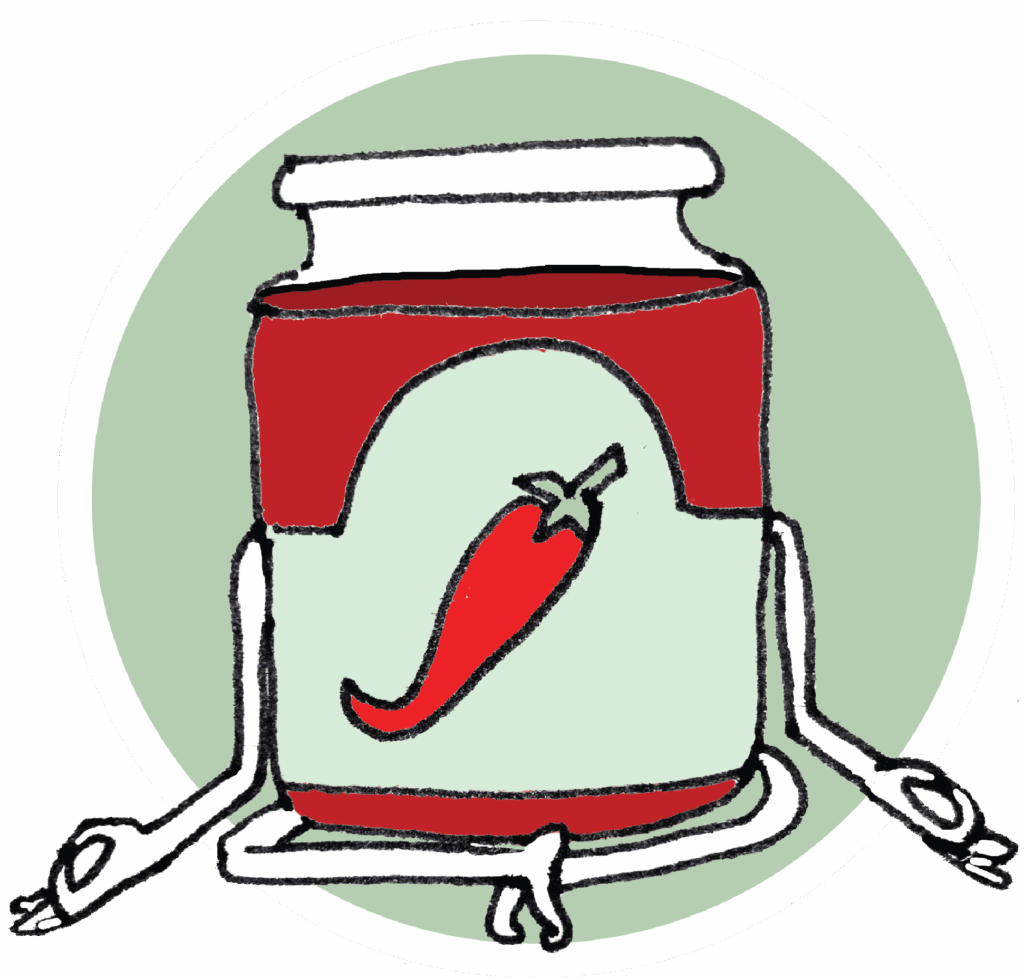
Big fan of sriracha? Love the flavour of Gochujang? Tried out our Thai sweet chilli sauce? Put chilli garlic sauce on everything?
Then you’re ready. You’ve ascended to a spiritual level of Asian hot sauce and you’re on the brink of taking your next step. Indonesian Sambal is your step into enlightenment.
On a side note, why is chilli always associated with hell? Is it because of the colour red, the fire, the pain… ok never mind, got it. But this sambal will take you in the opposite direction from eternal damnation. It will help you transcend into heaven.
This is not a Hot Ones challenge, Sambal is not about fiery heat. Yes it’s spicy, it’s got enough chillies in there to scare you. But it’s also about balance – while Sambal is hot, it’s also bright and sweet, with garlic and umami shrimp paste punching through the heat. It’s not spicy merely to make you sweat, it’s spicy to make you wake up to the truth of your existence. Transcend your reality with Indonesian Sambal.


Gather the Ingredients
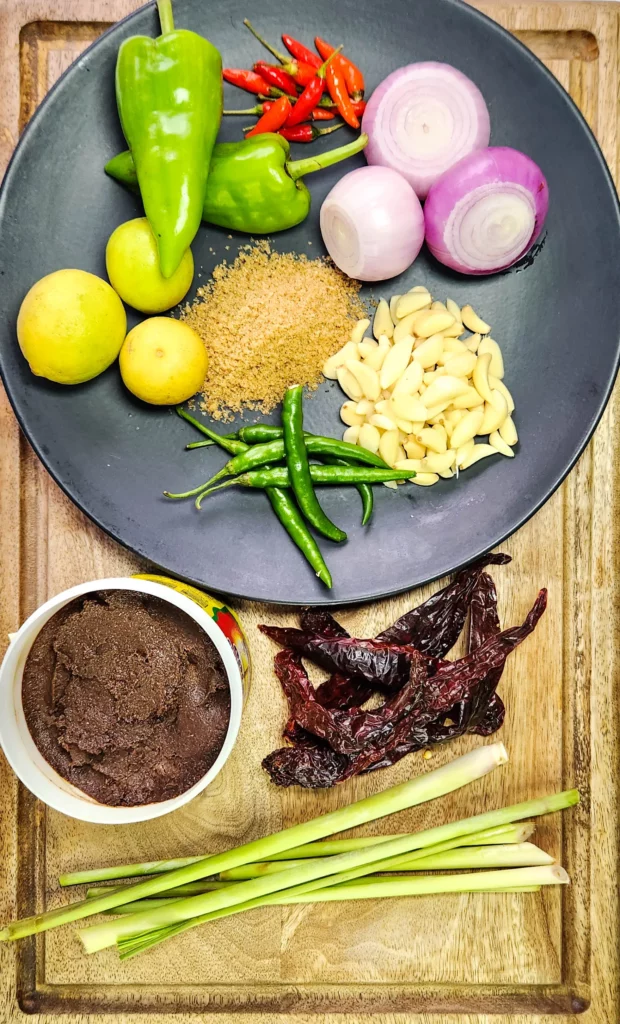

Dry Roast the Dry Chillies
Dry roast 1 cup dried red chillies, add 1/2 a cup of water to the pan and then put aside for the chillies to soak in the water.


Sauté the Ingredients
Add all the ingredients except for the shrimp paste, vinegar and the dried chillies, and the oil and sauté on a medium heat.
Now, add shrimp paste and sauté until the onions caramelise. Add vinegar and cook until it becomes a thick sauce. Add the toasted dry chillies and water into the pan.

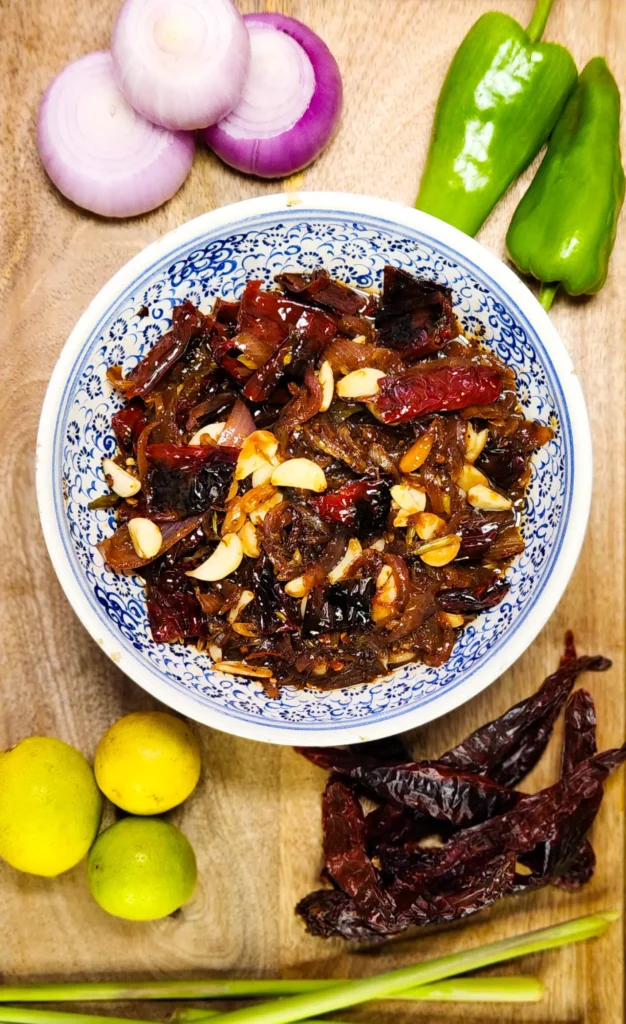
Put into a food processor with 3 tablespoons lime juice and blitz it to your preferred consistency.

Serve and Enjoy!
Serve it as a condiment or complement fried chicken, put in stir fries or on grilled meats.
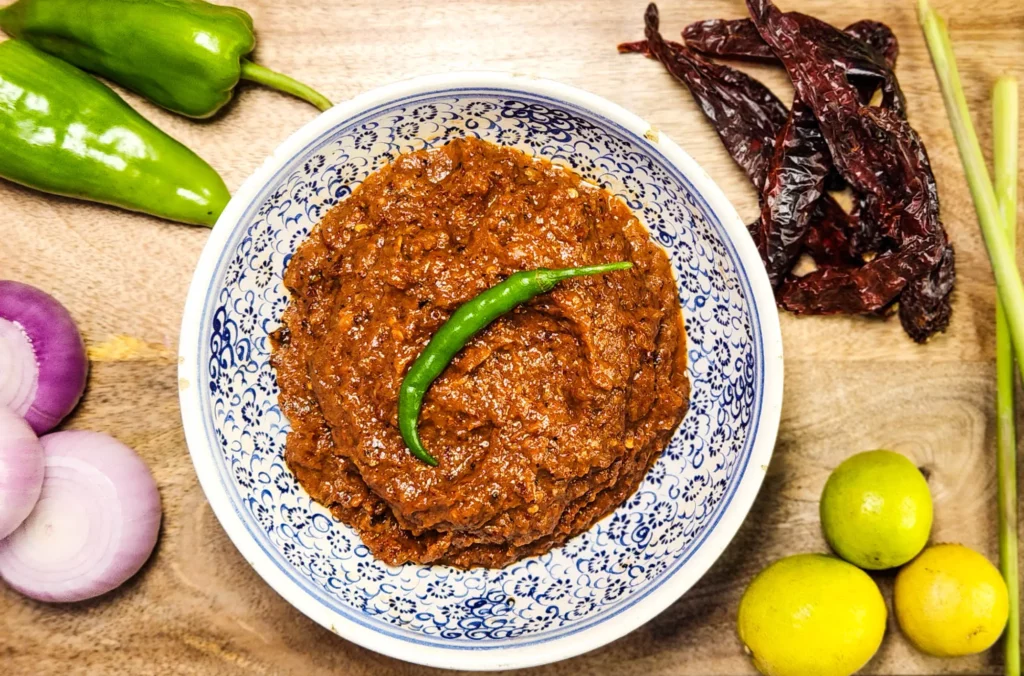

- Reduce the spiciness by using half the amount of dried chillies and use sweet fresh chillies instead of the red and green fresh chillies that are used in the recipe
- If you still want a milder Indonesian sambal, use 1 tablespoon smoked paprika instead of dry chillies and a teaspoon of tomato paste to the same amount of water in the first step.
- If you can’t find Indonesian dry fermented shrimp paste, you can use Thai kapi, or Malaysian belecan
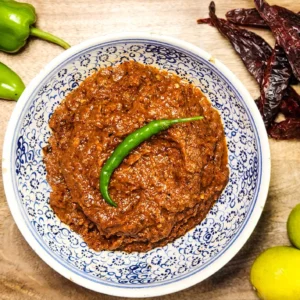
Indonesian Sambal Terasi
Equipment
- Non stick frying pan / saucepan
- Food processor or Blender
Ingredients
- 1 cup sliced shallots or red onions
- 1 cup garlic cloves whole, peeled
- 2 tablespoons fresh lemongrass chopped
- 1/2 cup fresh chilli red or green, roughly chopped
- 1 cup dried red chilli roughly chopped
- 1 tablespoon dry fermented shrimp paste terasi or belacan (Malaysian shrimp paste)
- 3 tablespoons palm or coconut sugar you can also use regular sugar or honey
- 1/2 cup white palm or coconut vinegar *the chef recommends coconut vinegar
- 3 tablespoons lime juice
- 2 teaspoons salt
- 1 teaspoon black pepper
- 3 tablespoons of cooking oil any variety *the chef recommends coconut oil
- 1 heaped teaspoon MSG optional
Instructions
- Dry roast 1 cup dried red chillies, roughly chopped in a pan on medium heat, until toasted (about 2 minutes) Keep stirring to avoid burning the chillies.
- After the chillies darken add 1/2 a cup of water to the pan and stir on the heat for another minute. Take off the heat and put aside for the chillies to soften and soak in the water.
- In a fresh pan add all the ingredients except for the shrimp paste, vinegar and the dried chillies, and the oil and sauté on a medium heat until the onions are translucent (around 2 minutes).
- Add 1 tablespoon shrimp paste and sauté for another 5-8 minutes. Keep stirring until the onions caramelise.
- Add 1/2 cup coconut vinegar and cook until it becomes a thick sauce. About 2 minutes.
- Add the toasted chillies with the water and cook for another 2 minutes.
- Take off the heat and allow it to cool.
- Put into a food processor with 3 tablespoons lime juice and blitz it to your preferred consistency. You can keep it chunky or make a smooth paste.
- Serve it as a condiment or complement fried chicken, put in stir fries or on grilled meats.
Video
FAQ
This sambal can be stored in an airtight container in the refrigerator for up to 2 weeks. For longer storage, you can freeze it in small portions, where it can last for several months. Always use a clean spoon to scoop out the sambal to prevent contamination.
While terasi is the traditional ingredient, if you can’t find it, you can substitute it with other types of Asian shrimp pastes, such as Thai kapi, or Malaysian belecan. Keep in mind that each variety has its own unique flavour profile, so it may slightly alter the taste of your sambal.
The spiciness of this sambal can vary depending on the type and amount of chillies used. Typically, it’s quite spicy, but you can adjust the heat – see the chef’s tips for reducing the spiciness.
Sambal Terasi is incredibly versatile. It can be used as a condiment to accompany dishes like grilled or fried meats, tofu, tempeh, and vegetables. It’s also great as an ingredient in stir-fries, noodle dishes, or mixed into rice. Some popular pairings include Ayam Goreng (fried chicken), Tahu Goreng (fried tofu), and Nasi Goreng (fried rice)


